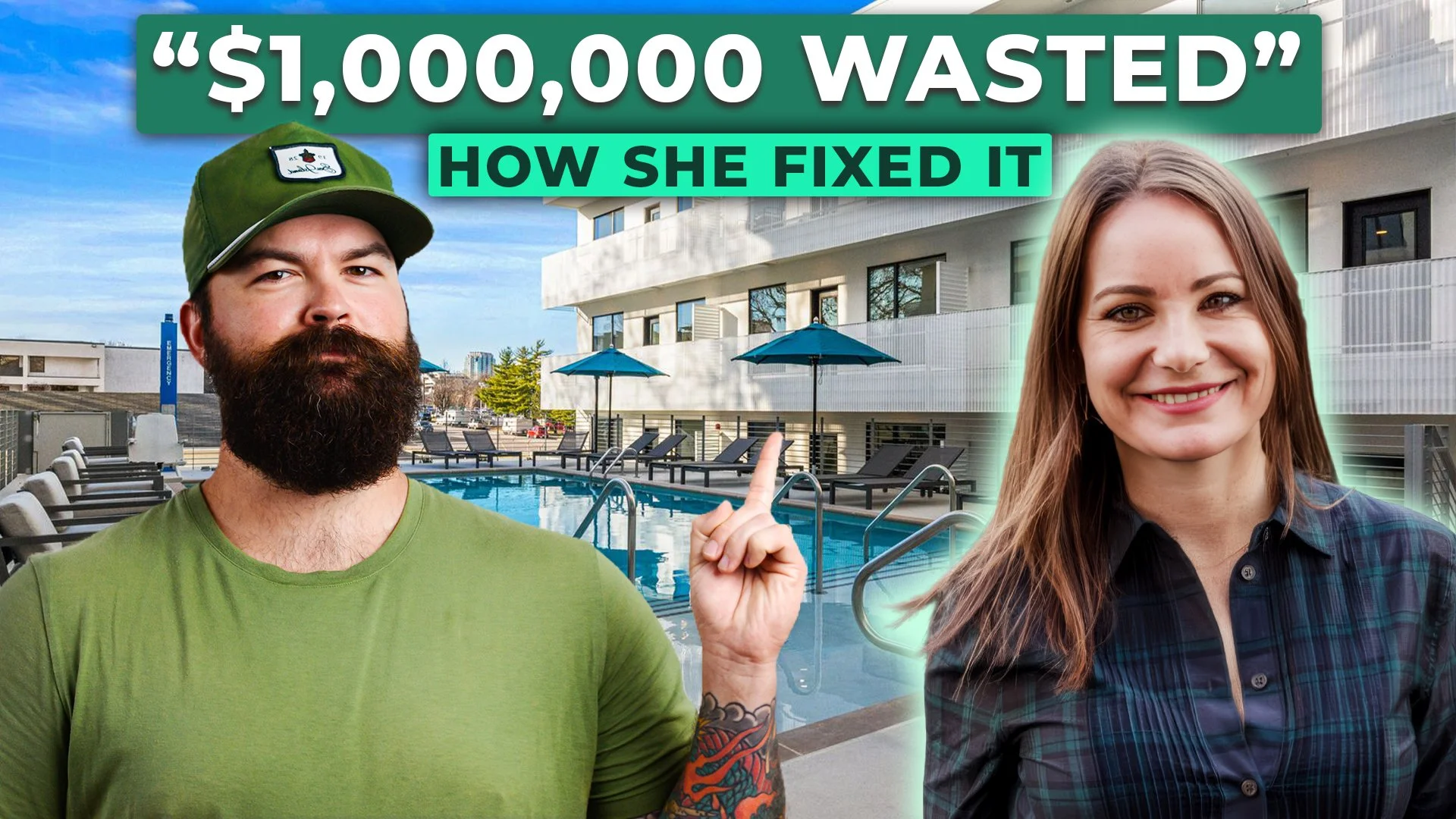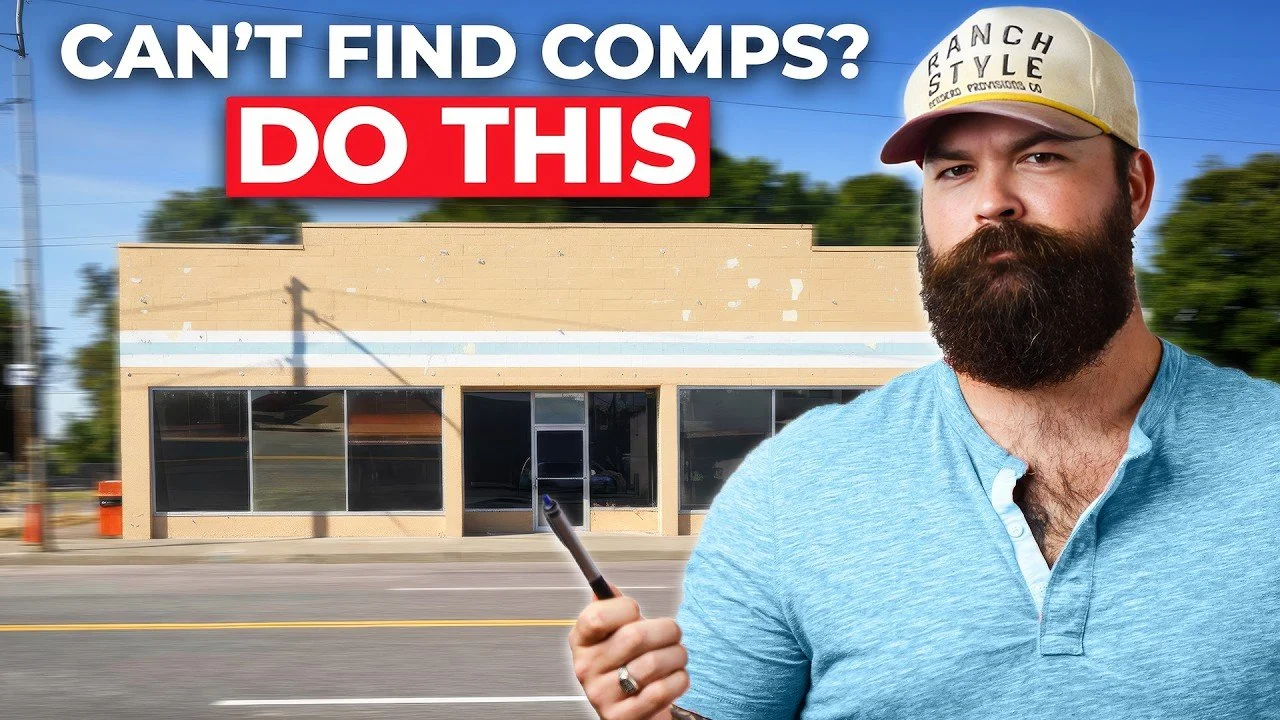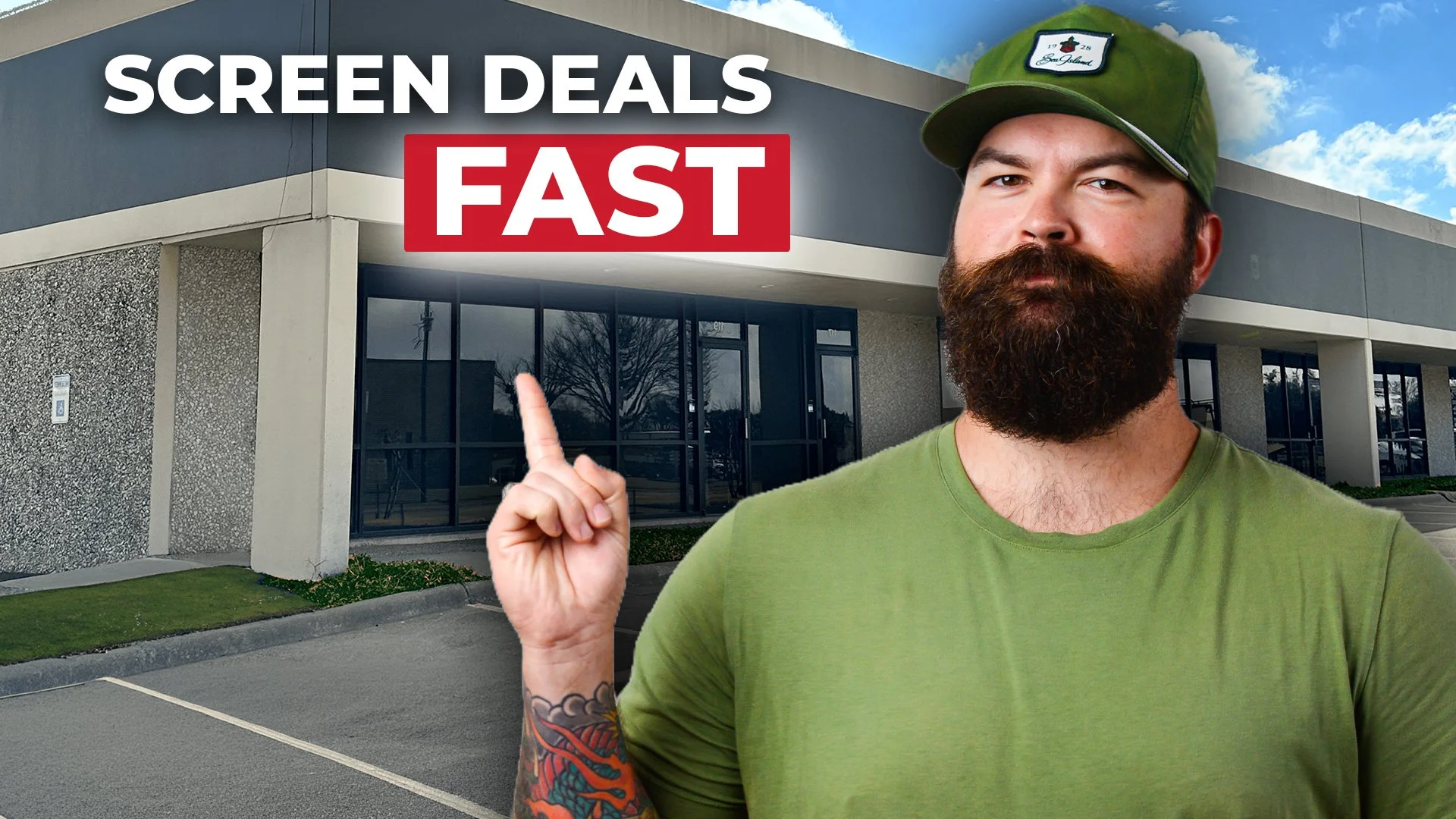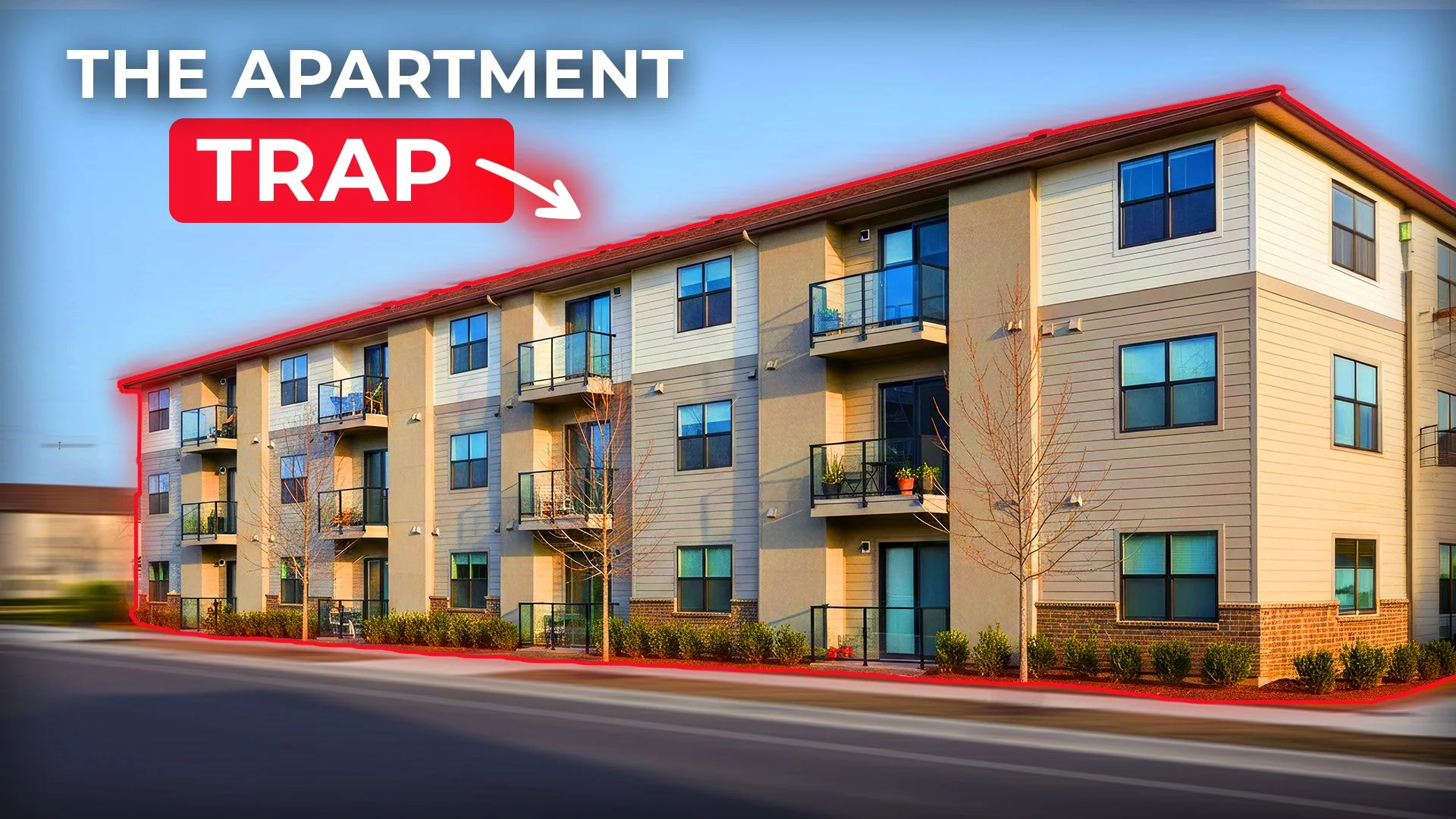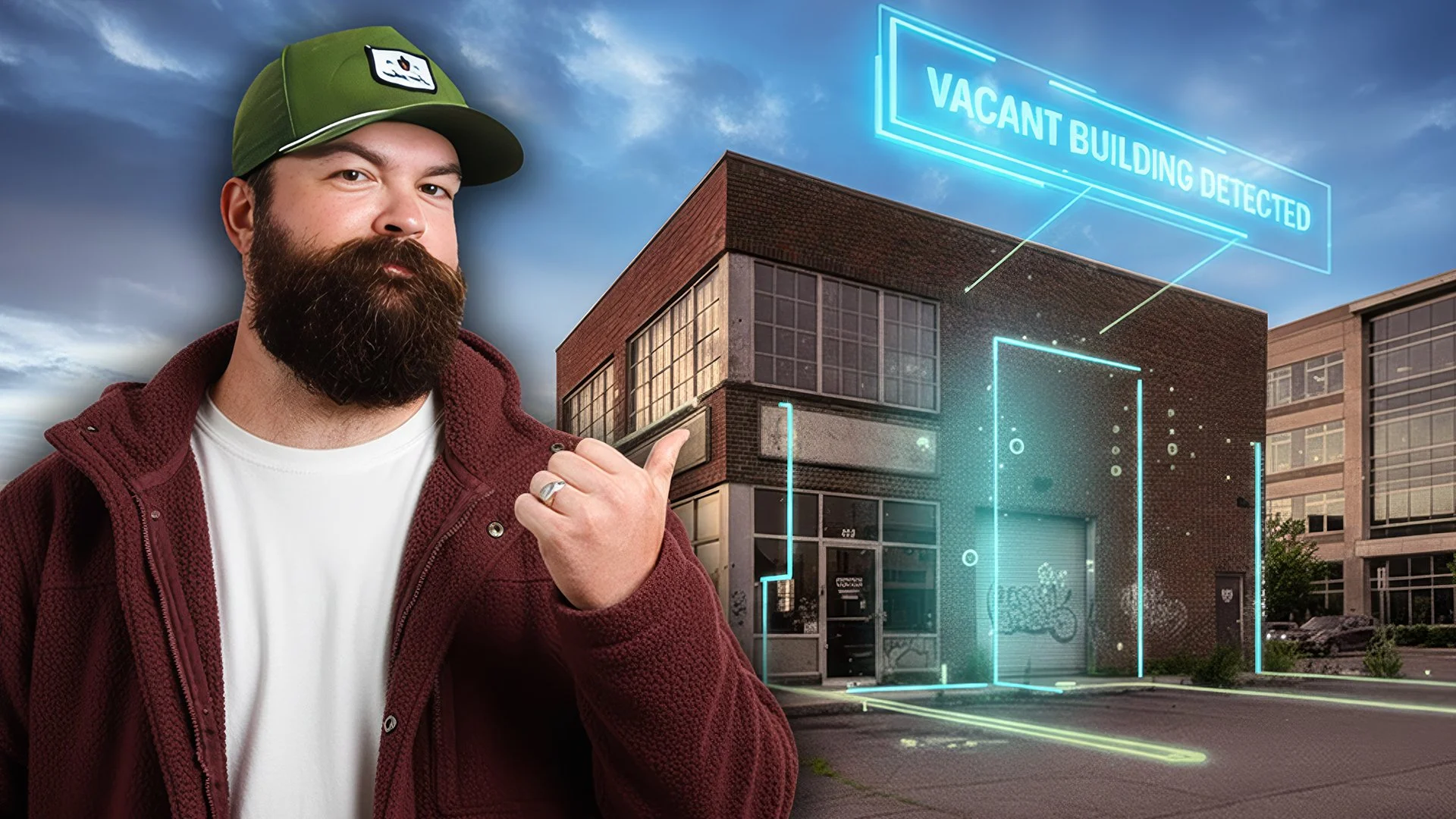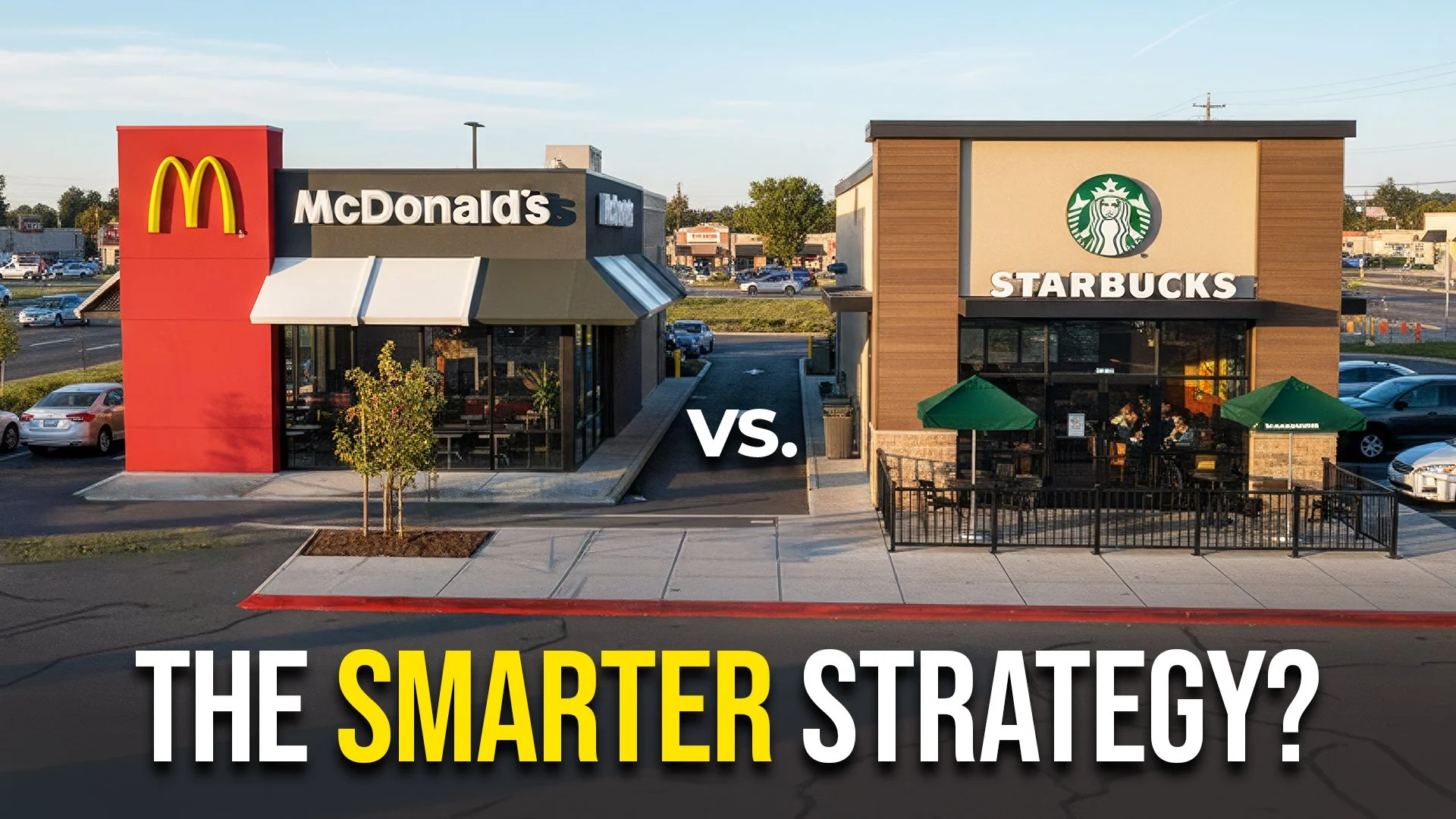The Power of Creative Capital in Commercial Real Estate | Office Hours
In this episode of the Commercial Real Estate Investor Podcast, we’re exploring the art of Creative Capital—how to leverage strategic funding options and partnerships to accelerate your real estate journey.
I’m breaking down my proven methods for building wealth in commercial real estate without needing millions of dollars in the bank. You’ll learn why Creative Capital stacking is a game-changer, how to leverage 100% seller financing, and how I’m constantly connecting with high-net-worth investors and partners to scale faster. I’ll also share insights from the CRE Accelerator Mastermind, where I help investors navigate complex deals and build successful portfolios.
We’ll cover:
Why not all capital is created equal and how to find the right fit for your deals.
How to structure partnerships that maximize your profits without taking on unnecessary risk.
The importance of a strong mentor or coach to guide your growth.
Real-world examples of how I’ve used Creative Capital to acquire and scale properties.
Pro tips for using lines of credit strategically—so you can move fast on the right opportunities.
Whether you’re an experienced investor looking to scale or just getting started, this episode is packed with actionable insights to help you level up.
Let’s get into it.
Get commercial real estate coaching, courses, and community to jumpstart your investment journey over at CRE Central: www.crecentral.com
Key Takeaways:
Creative Capital Matters More Than Cash
You don't need all the money upfront to invest in commercial real estate
Focus on controlling the deal and finding creative financing options
Explore strategies like seller financing, lines of credit, and investor partnerships
Financing Strategies
Consider 100% seller financing for commercial properties
Use lines of credit strategically if investment returns exceed interest rates
Partner with experienced investors to leverage their track record
Investment Goals
Aim for 18-22% internal rate of return
Target 20% annualized cash-on-cash return
Look for deals with multiple value creation opportunities
Networking is Critical
Attend real estate investor events
Build relationships with potential partners
Do thorough due diligence on potential investment partners
Risk Management
Prefer fixed-rate loans over adjustable-rate mortgages
Pay cash for land investments when possible
Always have a clear strategy for debt service and cash flow
Focus on Creating Value
Look for opportunities to provide affordable spaces for businesses
Consider unique amenities that attract tenants and employees
Think creatively about property development and usage
About Your Host:
Tyler Cauble, Founder & President of The Cauble Group, is a commercial real estate broker and investor based in East Nashville. He’s the best selling author of Open for Business: The Insider’s Guide to Leasing Commercial Real Estate and has focused his career on serving commercial real estate investors.
Episode Transcript:
Tyler Cauble 0:00
This episode of the commercial real estate investor podcast is brought to you by my cre accelerator mastermind, where you'll get access to my step by step investment blueprint, essentially a library of resources on how to invest in commercial real estate. You'll get connected to a supportive community of other commercial real estate investors that are doing projects just like you. You'll get personalized coaching and feedback from me every step of the way. Go to www dot cre central.com to learn more. Welcome back to the commercial real estate investor podcast. We are live from the combo group studios. Today is Tuesday May 13, and we are diving into office hours. You have questions around commercial real estate. I get a lot of DMS from you all on Instagram about how to do this deal or how to structure something like this. That is what this time is for. Y'all jump in, ask those questions. Happy to dive in and give you whatever response, whatever advice I can. As we are live today, I kind of want to talk about some creative capital and risk control. That's a theme that I've started to notice. Started to notice out of our group coaching calls in the Siri accelerator mastermind. So we'll definitely dive into that as well, as well as your questions while we are waiting for those questions to come in. Catch you up. Kind of what I've been up to this past week. It was a bit of a light week, in the sense of like, fun updates to give you guys. This past week has has been one of the busiest weeks that I've had of my entire career, simply because we have so much going on, but a lot of it's just busy work. It's a lot of property management stuff, it's a lot of brokerage stuff. We are just in the throes of it, and it's it's hopefully building up to be something good. But sometimes, as a business owner, it just takes it, takes it out of you with with all of the blocking and tackling that you have to do. But couple of highlights from the past week, I did have a my monthly two hour meeting with my my business coach and mentor, which is always a phenomenal, phenomenal two hour session. For me, it's basically business therapy. If you don't have a business coach or a mentor that you know is 20 steps ahead of where you want to be, that can share advice and hear you out and help you mold what you are trying to become, I highly recommend going out and trying to find that person. My mentor, helps me through so much. And so I presented him with all of the the the problems and the the great things that are happening within the companies today, and got some phenomenal advice from him. And so we are working through some pretty exciting things. To be honest with you, I'm kind of changing how the brokerage is going to operate moving forward, we're re envisioning what the property management company could be, and starting to really think differently about what this YouTube thing could become. You know, this, this online commercial real estate educational platform, which has been really fun to be working on for five years now, it's kind of hard to believe that we started this YouTube channel in April of 2020, and here we are, five years later. I think over 600 videos at this point, which is kind of wild, kind of wild to think about. Kimberly is saying it, saying morning Tyler, so excited. I finally got the time right for the live Good morning. Kimberly. Kimberly brokers, mastermind, glad you got to join us. Kim Great to see you. Hope everything is well in your world, so it's, let's see, what's your fee for being a mentor? Well, so, Ellie, I don't, I don't really charge a fee for being a mentor. You can join the accelerator mastermind, and you know that one the price changes right now, it's 7k a year to join the mastermind. There's over 120 members in it right now, and it's, it's pretty great. We've got two calls a week, but, you know, it changes. It could go up at any time. Hopefully by the end of this year, it'll be at 10k That's what I'm aiming for right now, based on the amount of people that are coming in. So that's, that's what we do. And we'll be diving into today a theme that I have noticed within the group, that I think will be a good thing for us to talk about as well. And then, you know, yesterday, I was in Chattanooga all day. You know, we're doing a 350 unit self storage facility out there, and in in two of the buildings that I have, out of the 29 buildings at the peerless mill, there is a lot at that property. And it feels good to finally have something of this scale going and then starting to realize, like, okay, as much capital as we are putting into this project now, I still have so much to go with all of these other buildings, we gotta, you know, start doing more. So I'm starting to think through what are the creative ways that I could structure other deals. Because I really want to open up like a small business maker's marketplace, right? Kind of like a farmer's market, but open permanently to where you as a business owner could come and rent a 100 square foot booth all the way up to a. A 2000 square foot booth, and do it in a really cool industrial manner, but incredibly affordably, but make it a destination for people around Chattanooga. So starting to think through that, how I would raise capital for that, how we would structure that deal. If you have any ideas, let me know in the comments, what would be all ears, because I think something like that could be really cool. And we could have, you know, a marketplace that's 3040, 50 plus tenants all in one spot, which, I mean, think about how great of a destination that could be to go spend a Saturday, right? Wouldn't that be fun to be able to go and see 50 small businesses and do your shopping there and support local on, you know, for holidays or whatever. I think, I think it'd be a lot of fun, and plus, you're giving small businesses a chance to start up affordably. I think that that's one thing that a lot of people don't talk about enough. We talk a lot about how the affordable housing crisis is in full effect, and, you know, we need to do more about it. We're experiencing the same thing in commercial real estate. It is very unaffordable to start up a business on the entrepreneurial side, right, commercial space is very expensive. So how do you go about solving that problem? And so, you know, I want to find ways that we could do that at really market rates, without having to get subsidies or tax breaks or whatever, but provide really cool, unique, affordable, startup spaces for businesses. I think it really neat Kimberly saying just read that Audi is considering moving to Chattanooga. Wouldn't surprise me. Volkswagen is just outside of Chattanooga. It's a great spot, great part of the country to be I mean, if you think about it, within a two hour drive of Chattanooga, you can be in Atlanta, Knoxville, Nashville, pretty sure, Birmingham, and then, of course, over into the Carolinas. I mean, it's, you know, you're not too far from a lot of stuff from Chattanooga. It's surprisingly well positioned, that's for sure. All right. So today I wanted to dive into creative capital and in risk control. Like I said, this is a theme that I'm kind of noticing popping up in in the Siri accelerator, and so I figured it'd be a fun thing for us to talk about here today. So the big idea here, when it comes to commercial real estate, is, it's really not about how much money you have. It's it's how creatively and and strategically that you can deploy the capital that you can control, right? That doesn't mean that you have to have a whole bunch of money, right? That just means that you need to be able to get creative and strategic with what you are doing, right? So I want to talk about the power of Creative Capital stacking. You really don't need all the money, right? You just need control of the deal. And we talked about that before on this channel. You just need to be able to get control of the deal, because that's really kind of where all the power comes in, right? You don't have to be the person that has all the cash or has all the connections, if you find the right deal and then have the connections. You know, I've had plenty of deals where I never had the money to take them down. I definitely didn't have the balance sheet to justify getting a loan for it. But because I went out, I found the deal, I put it under contract, I controlled it. I was then able to go out and negotiate with much bigger investors and say, Hey, bring me in as a smaller partner. Here's the value that I'll bring to the table. On top of just bringing this deal, let's make this happen. And that has worked very successful for me. So, you know, make sure that you're going out and you're finding incredible deals, and just make sure that you structure them the right way, right? You don't have to be a 5050, partner with these people if you're not bringing any capital to the table and you're not having to, you know, I mean, of course, you're probably gonna have to sign on your pro rata share the debt. But let's assume maybe you don't, right, maybe, maybe you find such a big deal that you take it to a big group, and you don't have to sign on the debt at all. I would take 5% or 10% of a deal like that all day. I would do that deal all day. I don't need to be, you know, the bigger slice of the pie in that one if, if I'm not having to put up cash or raise capital, and I'm not having to put the debt together, that's a great deal. I love those opportunities, you know. But most beginners think that the only path to getting started in commercial real estate is by saving, you know, 20 to 30% down. And you know, that can be very daunting when you're looking when you're looking, when you're coming from residential real estate, where you can get very creative and put down three and a half percent or 0% sometimes five or 10, you know, all of a sudden you're having to look at 20, 30% that's a lot of money, especially when you're talking about, you know, 1235, plus million dollar deals. Right now, you're talking 20 to 30% of a million dollars, that's 200 $300,000 that you've got to put together, right? That's a whole bunch. And so, you know, you really don't have to take that approach. I mean, we have one student here recently, and the accelerator that just secured a 100% seller finance deal
is. Grow down 100% seller finance, and that's, that's on a commercial property. You know, that's, that's very common in the residential world. People don't think about doing that in the commercial space. But you can get very creative, right? I mean, if you're, if you're the seller of a property, you got to think through what, what would make sense? Why would you want to do a deal like that. And there are plenty of reasons, right? There are actually plenty of reasons why you might want to sell a deal at 100% financing. Maybe you're just tired. Maybe you are just tired of dealing with a deal and you don't want to work on it anymore. Maybe you're moving away, and it's not something that you can look at every day. And maybe you don't want to have the tax burden. You don't want to have to pay taxes this year. You know, maybe you want to be able to plan for that for a few more years. 100% seller financing makes so much sense, and that's how you get creative with these deals. You got to ask the questions. Ask the questions of the seller to understand why they're wanting to sell, or why they're wanting to sell, or why they're wanting to get rid of the property, because that's how you put together the best deal. So go out and explore seller financing. Explore getting a line of credit on your house or a line of credit on another property that you have, and drawing down on that capital. The great thing about lines of credit we have, we have a handful of students in the accelerator that are, that are, they've paid cash for their first deals, and they're putting lines of credit on them, instead of just refinancing and putting debt. What that allows them to do is keep all of the cash flow from the asset today because it doesn't have any debt on it. Technically, it just has a letter of credit or a line of credit. When they find the next property they can draw down on that line of credit, and they'll start paying the interest at that point, as soon as they pull down that cash, then they can deploy it, then they can refinance the debt, and, you know, restructure the deal. And it's a great way to do it right, because you're not having to put the interest on that property today to diminish your cash flow. So that's one thing to think about as well. You know, you could also, of course, go out and raise investor capital. That was a big discussion that we had in the group call last night. You know, raising, raising capital can be daunting, especially if you've never done a commercial real estate deal before. Typically, what I recommend is, if you're going to do your first deal, go and find a partner that has done commercial real estate before, and partner with them, borrow their track record and learn as much as you possibly can from them, because it'll make raising capital significantly easier, but it'll help you sleep at night knowing that this massive responsibility that you have taken on is a little bit more secure, right? Because I completely understand what it is like going out and raising investor capital for the first time, wondering if you're making the right choice, wondering if you are secure in your underwriting, wondering if you're going to hit the lease up that you think you're going to right? I've been there. I have lost sleep over it before, right? My first deal, all I did, I just raised $100,000 from two investors. So $50,000 each. I mean, today, you know, I have investors that, I mean regularly, put that much in total each, right? 100,000 and I mean, I could not sleep the night before. It was a small deal, $575,000 you know, and I still couldn't sleep the night before, just thinking, gosh, did I make the right decision? Can I figure this out? And, you know, the next day I went and I signed the closing documents, and I was like, wow, nothing changed. You know, was it like all of a sudden there was just this big, heavy weight on top of me or whatever, just, oh, okay, Nothing's different. We signed it time to get to work. Time for me to go and do what I do best, which is find tenants and manage properties. And so you know that that was when it kind of clicked for me, of like, you know what? If these people are willing to trust me, because they've seen what I've been doing for five years in the commercial real estate world, I should be able to trust myself too, right? And so that was kind of a conversation that I had to have with myself. Kimberly is saying, do you just do a financing contingency in the PSA for those that's a good question. So Kimberly, we, I actually don't have any contingencies in my purchase and sale agreements. I know that that's a little bit of a different way of thinking about it, but I don't technically have a separate contingency for anything. Specifically, I have a an overall due diligence period in my purchase and sale agreements, which means that within that due diligence period, call it 60 days, 90 days, whatever the DD period is, I can back out for whatever reason. After that point, then, you know, I lose my earnest money. But it completely depends, right? If we're getting towards the end of the due diligence period, and I have waived all of my contingencies, or I have satisfied personally, like I feel good about it, because I don't have to technically waive anything. But I feel good about, you know, financing. I feel good about, you know, investor, capital, whatever it is. And there's one thing outstanding. Thing, right, that I just don't feel comfortable with. I go to the seller and I say, hey, we have to satisfy this. I would either like, I would like to extend the due diligence period, and either they say yes or no, and typically it's, it's yes, because I present to them exactly why we have to extend for that reason, right? If it's no, then I say, Well, look, we will let the DD period expire, but I have to have a contingency based on this, right, and so you can actually have an amendment to the purchase and sale agreement that kind of helps you, helps you through that. Ronnie is asking, how do you recommend finding a good partner for your first commercial real estate deal is a great question. Ronnie, I mean, the big thing is one, go out to every networking event, right? Make sure that you're just meeting people. If you're not getting out and going to every UI event, every CCIM event, every you know real estate investors event, whatever it is where all of these investors are going to be, then you're you're not going to give yourself the opportunity for success, right? You have to put yourself in the places where these people will be, so that you can then network with them. Then once you start to get to know people, spend some time with them, right? Go and look at their projects. Show them your projects, or show them what you would like to do, or projects that you like, right? Just so that you guys can spend time together and get to know each other a little bit better. And then, of course, ask around, ask about them. Commercial real estate is a very small world. And if somebody is a bad person, which, hey, just like any industry that money is involved in, which is most of them, there are plenty of bad actors, right? And commercial real estate is certainly not immune to that, so I would say go out and just make sure that you're doing your due diligence on any partner. All right, let's talk about using lines of credit, because I think that that's a pretty interesting opportunity for a lot of people, because, you know, if you've got equity in your house, a line of credit can allow you to move, you know, pretty quickly. I'm working on getting a line of credit on my house right now, and I think it's like 9% interest, pretty high. But the thing is, I don't have to draw down on it and start paying that interest until I actually need to use it. And then, of course, once I draw down on it, I can then refinance and blend that rate into a longer term loan, which, you know, today, for at least a residential mortgage, is just under, like 7% so it'll be a little bit higher than what I am I'm currently paying on my my current mortgage, but it's a lot lower than 9% and I'd be able to blend it together, but that allows me to have the have the cash in reserve so that I can draw down and move quickly if I want to right. So my rule of thumb for for utilizing lines of credit, it doesn't matter if the line of credit, if the interest rate is at 5% 9% or 30% right? It can still make sense to use a line of credit to go out and buy commercial real estate, as long as the debt that you are drawing down on the line of credit that interest rate, the investments that you are buying have more cash flow than that interest rate, right? So, I mean, if you're, if you're drawing down on a 9% interest for your line of credit, you want to make sure you're getting like a 12% cash on cash return with your other deal, right? Because then you're collecting a spread of a 3% net cash on cash return, right? Does that make sense? I'm taking money that I'm paying 9% on, and I'm buying real estate where I'm netting 3% right? So I'm netting 12, but then I'm paying the nine, so I'm taking home three. So yeah, it's not a phenomenal cash on cash, but I'm borrowing money that I don't have to pay anything for, because this new investment is basically covering that and making me 3% now, I wouldn't necessarily jump out of bed and go crazy getting a bunch of debt to make a 3% spread. I just want to use that as an example. If you go and find something where it's hey, I can borrow money at 5% and I can make 10% that's a hell of a deal. Do that all day, right? Kind of tough to find that these days, but that's typically when you're going to see a line of credit make a lot of sense, because then your cost of capital is is next to nothing. It's a very strategic way to use some capital that you might just not be tapping into, some equity that's really trapped in another in another project, right?
So let's see. We got some more questions dropping in. Vicin is saying, Tyler, I don't have credit. I want to get a loan from a bank to get started investing. What can I do? They can I got some bad news for you if you don't have credit, unless you've got a lot of cash and in, that's a lot, a lot of cash. Cash, then the bank's probably not going to want to give you any money. So the best thing for you to do is to go out and find a partner, find, you know, go out and do what I was telling Ronnie to do, right? Go out and network, go out and find those partners that would be willing to let you, borrow their balance sheet, borrow their track record, borrow their capital, right as investors, and partner with them on these deals, and go out and find the deal right. And just start building that track record up, start building that cash flow up, right? Because all it takes, I mean, even if you get a small percentage of these deals, you go out and you start building up $500 a month from this deal and $1,000 a month from this deal. It won't take you too long before you get to, you know, 10,000 $20,000 a month in passive cash flow, and you'll be able to start doing your own deals from them. Ellie is saying, What is your percent on capital investment? What is your percent on capital investment? Ellie, can you clarify what that question means for me? Please. Not exactly sure what you're asking there. Noticing, what ideas do you have that is an employee friendly area, like outdoor picnic area, or something else at a commercial building? So Evan, I'm assuming that you're asking about kind of like amenity spaces, that would make sense. I mean, look, you know, people have dogs. Why not do a little dog park? Right? I think having a dog park at your office building today is a great way to convince people to leave their homes, right? Because most people have dogs, right? Or at least a lot of people have dogs. Most people in my world have dogs. I don't know what the actual stat is, but if you're able to say, hey, we've got a great dog park this, this office building is dog friendly. Bring your dogs. They can hang out outside whatever, you know, then there you go. I mean, that's, that's a great amenity to have, I know if, I mean, obviously I don't have a dog park in my building, and my lifestyle doesn't necessarily make it easy for me to bring my dogs to work, but if it did, that'd be a great thing to have, be a really great thing to have in terms of other employee friendly areas outside. I mean, a picnic area is great. Just honestly, just like a little gazebo with a table, you know, a little covered area is always kind of nice. I don't go too crazy on on those outdoor amenities. You know, let's see. Chris is saying, How common is it to get an AR M to close on a property than a refi two to five years later into an SBA loan or something kind of fixed rate loan? I mean, I wouldn't say it's uncommon to get an adjustable rate mortgage to close on a property. I mean, it's going to allow you to move faster, right? Maybe, I mean, it depends on the bank and depends on what their qualification requirements are. A bank may be able to move a little bit faster. Maybe they'll have an approval faster. That approval process that goes faster simply by by your accepting an adjustable rate mortgage. In my opinion, there's never a good time to take on an adjustable rate mortgage. I don't touch them. I don't really. I know that there are some investors that swear by them. They love them, but here's my thing, I've got plenty of stuff to worry about. I don't want to have to be thinking about my debt all the damn time. That's just one more thing that I don't want to have to add to the list. And to be honest with you, am I paying more in interest by having a fixed rate loan for five years? Yeah, of course, absolutely I am. But I just look at that as an insurance policy of hey, I don't have to worry about this going up and spiking overnight to the point where my debt service coverage ratio no longer works, and I either have to put money into this deal or lose it, right? That has happened to a lot of investors. It's happened to a lot of investors here recently. Let's see Ellie is saying, I mean percent return on investment. I mean now if you're asking me what my like intended goals are, 4% return on investment, you know, I aim for 18 to 22% internal rates of return. I mean, that's what we raise our capital based on, it's what we do our deals based on. That's what we tell our limited partners that we're aiming for, which ends up being about a 20% annualized cash on cash return and about a two times equity multiple over a five year period. That's what we're aiming for as we are going through this. So that's, that's really it. So, yeah, I mean, you know what I would kind of leave you guys on on this whole, you know, Creative Capital discussion is, is, you know what? What dry powder do you control right now? Right? If you don't have a bunch of cash in the bank, that doesn't necessarily mean that you don't have access to something, right? Sure, maybe some of you have personal cash, right? I mean, we've got plenty of high net worth and high earning individuals that that listen to this podcast, that invest with me. You. That are in the accelerator. But some of y'all don't right. Some of y'all are just getting started in commercial real estate. And if you don't, go find a high net worth or high earning individual that does right, check check out your equity lines, right. Go explore investor relationships, start having those seller financing conversations. You know, there's plenty of opportunities there to be had where you don't necessarily have to be bringing all of your own capital to the table. Joey is saying, Tyler, I got an out of New Jersey, worst real estate, commercial real estate, red tape market sold out of all assets to cash and now out in Arizona, where it's cheap, thoughts on land or existing, structured property. Joey, I love Arizona. I've had a great time out there. I would say, like, thoughts on land. I mean, if you're, if you're looking to get into land banking, I mean, the great thing about it, you don't have to deal with tenants. You're just buying land in the path of in the path of growth and just letting the appreciation come to you. You know, that's always a pretty great thing. It's kind of hard to argue with that, right? If you've got the capital to just sit on land, especially if you know what's going to be driving the path of development, the path of growth towards you, that's a great thing to do, right? Highly recommended, because you're not having to deal with tenants. You're not having to worry about anything. About anything. But the big thing with land banking, in my opinion, is you want to pay cash for the land, right? There's a lot of investors that will go and buy land and put debt on it, and to me, like, unless you have a way to really monetize or pay for that debt service, monetize the land or pay for the debt service that's incredibly risky. It's a lot of risk, and I just don't like it, because that's how a lot of investors got belly up in 2008 2009 had a bunch of land that was non income producing, that had a lot of debt, and it was easy to pay for that debt when people were buying houses, or they were buying properties, or, you know, tenants were paying rent, and as soon as the music stopped, there was nobody there, and the bank still wants their note paid every month, no matter what's going on in the world. So I love land banking. I think it's a great strategy. If you have enough cash to pay cash, we've got to have a lot of capital, in my opinion, to make that work. And of course, you can't care about cash flow. So that is it for office hours this week. Join me every Tuesday, 8:30am Central Standard Time. Ask your questions about commercial real estate. Happy to dive into them. Thank you guys for joining me this week. If you are listening on Apple podcasts or Spotify, don't forget to rate and review. It helps so much getting this education out there to more people who may be trapped in residential real estate and don't want to be anymore. There is another option, and then it's commercial. If you're watching on YouTube, don't forget to like and subscribe, and we'll see you guys in the next one. This
episode of the commercial real estate investor podcast is brought to you by my cre accelerator mastermind, where you'll get access to my step by step investment blueprint, essentially a library of resources on how to invest in commercial real estate. You'll get connected to a supportive community of other commercial real estate investors that are doing projects just like you. You'll get personalized coaching and feedback from me every step of the way go to www dot cre central.com to learn more you.


